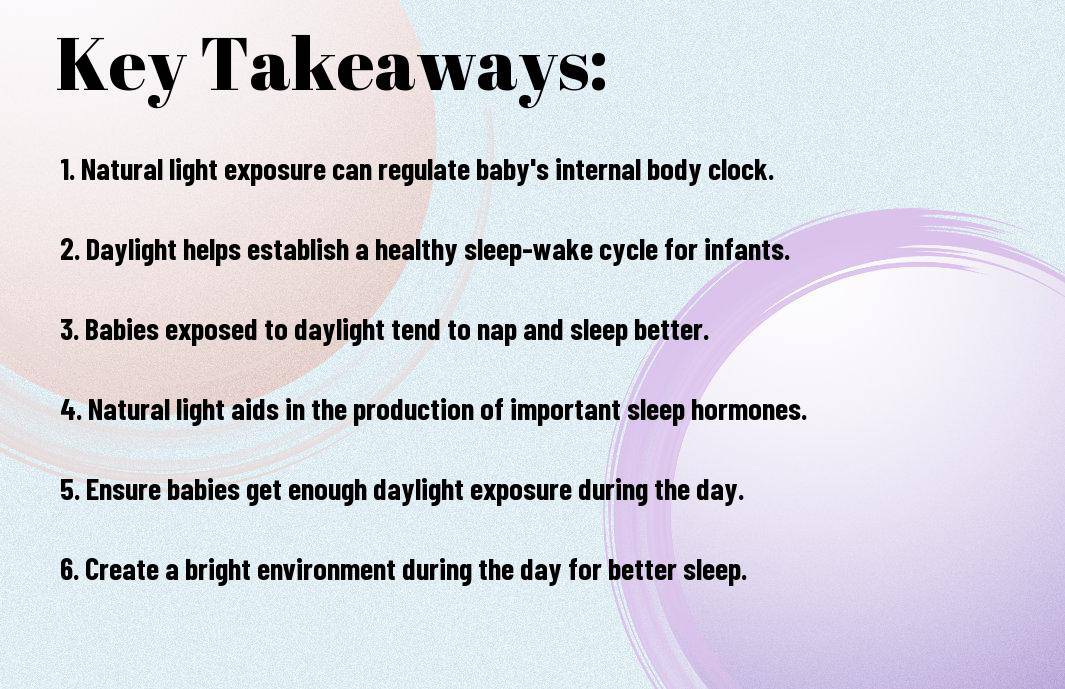tips, tricks and guides for parenthood
In this blog post, we will explore the impact of daylight exposure on a baby's sleep patterns. Daylight plays a crucial role in regulating our circadian rhythms, and this is particularly important for babies, whose sleep patterns are still developing. Understanding how daylight exposure can affect a baby's sleep can help parents create a more conducive sleep environment for their little ones. From the benefits of natural light exposure during the day to the importance of a dark and quiet room at night, we will research into practical tips to help your baby get the quality rest they need for healthy development. Let's uncover the significance of daylight exposure in shaping your baby's sleep habits.

Infants, like adults, have internal body clocks that regulate their sleep-wake cycles known as circadian rhythms. However, in the early months, these rhythms are still developing and are easily influenced by external factors such as light and darkness.
Light plays a crucial role in setting the circadian rhythms of babies. Exposure to natural light during the day helps establish a healthy sleep-wake cycle, while darkness signals the body that it is time to rest. Creating a consistent bedtime routine that includes dimming lights in the evening can help signal to your baby that it's time to prepare for sleep.
Exposure to daylight plays a crucial role in regulating your baby's sleep patterns. Natural light helps set their internal body clock, known as the circadian rhythm, which dictates when they feel sleepy and when they are alert. By exposing your baby to natural light during the day, you can help them establish a healthy sleep-wake cycle, leading to better sleep at night.
While daylight exposure is beneficial for your baby, overexposure to bright light, especially in the evening close to bedtime, can disrupt their sleep patterns. Excessive light exposure at inappropriate times can confuse their circadian rhythm, making it harder for them to settle down and fall asleep. It is important to strike a balance and ensure that your baby gets enough natural light during the day without being exposed to excessive artificial light at night.
Pertaining to managing daylight exposure for your baby's sleep, there are some practical tips to keep in mind. Exposure to natural light during the daytime can help regulate your baby's circadian rhythm, making it easier for them to distinguish between day and night. This will ultimately lead to better sleep patterns.
Ensure your baby's sleep environment is conducive to a good night's rest by keeping the room dark and quiet. Consider using blackout curtains to block out any external light that may disrupt their sleep. Additionally, maintain a comfortable room temperature to help them stay asleep throughout the night.
Pertaining to managing daylight exposure during naptime, aim for a balance between natural light exposure and keeping the room dimly lit. This can help signal to your baby's body when it's time to nap and when it's time to wake up. Try to align naptime with your baby's natural sleep cues to promote a more restful nap.
For more information on how outdoor activity can impact your child's sleep, check out How Outdoor Activity Can Impact Your Child's Sleep.
Conclusively, daylight exposure plays a crucial role in regulating a baby's sleep patterns. Exposing babies to natural light during the day helps establish their circadian rhythm, leading to better sleep quality at night. It is imperative for parents to ensure that their infants receive adequate daylight exposure to promote healthy sleep habits. By incorporating daylight into their daily routines, parents can positively influence their baby's sleep patterns and overall well-being. Understanding the impact of daylight exposure on a baby's sleep can greatly benefit both the child and the parent in establishing a healthy sleep routine from an early age.
A: Daylight exposure plays a crucial role in regulating a baby's internal body clock, also known as the circadian rhythm. Natural light helps to establish a consistent sleep-wake cycle, leading to better quality sleep for babies.
A: Daylight exposure can help babies differentiate between day and night, improving their ability to fall asleep faster and stay asleep longer. It also supports the production of important hormones like melatonin, which promotes better sleep.
A: Ideally, babies should be exposed to natural daylight for at least 30-60 minutes each day. This exposure should preferably occur in the morning to help set their internal body clock and promote healthier sleep patterns.
A: Excessive exposure to bright light, especially in the evening or at night, can disrupt a baby's natural sleep-wake cycle. It is important to strike a balance and ensure that babies are exposed to daylight during the day and dim, soothing light in the evening to support their sleep.
A: Parents can incorporate daylight exposure into their baby's sleep routine by taking them outside for a walk or spending time near a well-lit window during the day. It is important to expose babies to natural light, especially in the morning, to help regulate their circadian rhythm and improve their sleep quality.